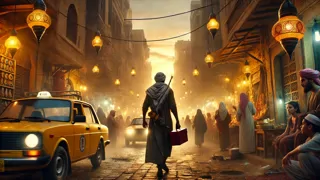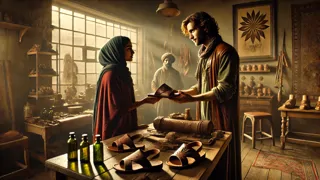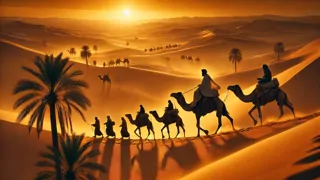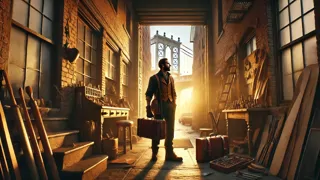Introduction
Ma’ruf stood at dawn before the narrow doorway of his Brooklyn workshop, the smell of polished leather and fresh shoelaces lingering in the cold morning air. The city was still waking, its skyscrapers promising opportunity and anonymity in equal measure. But Ma’ruf felt neither opportunity nor anonymity; he felt the weight of a broken promise lingering between him and Miriam, his wife of six years. For months, their quiet disagreements had grown louder than the hiss of his sole-stitching machine. When his father fell ill back in Alexandria, Ma’ruf bought a ticket to Cairo with trembling hands and a hesitant heart, carrying only his battered toolkit and a suitcase of memories.
As the plane descended over the Nile delta, endless fields of green and gold shimmered under a rising sun. The scent of spices drifted through the open window when he stepped onto Egyptian soil: cumin, coriander, and hope. He’d arrived in a land where languages shifted like the wind, and every cobblestone whispered of ancient kingdoms. With each step down the jetway, he vowed to learn its rhythms. He wanted to grind cassia bark into fragrant paste, barter for goatskins in Khan el-Khalili, and prove that a craftsman’s hands could mend more than just leather. This journey would test his resolve and redefine the meaning of home. In the land of his ancestors, Ma’ruf hoped to find both the thread that tied him to his past and the courage to stitch the patchwork of his future.
Departure from Brooklyn and Arrival in Cairo
Ma’ruf’s last dawn in Brooklyn was hushed and heavy with unspoken regret. He packed neatly: five pairs of polished leather sandals, a packet of cedar oil for leather conditioning, a worn journal, and a single photo of him and Miriam laughing in their small kitchen. Outside, the streetlamps flickered off one by one as taxis roared by on their morning shift. His neighbor, Mr. Patel, found him on the stoop and asked with concern, “Heading somewhere far, my friend?” Ma’ruf managed a wry smile and nodded. The rumble of a taxi engine undercut the stillness—his ride to JFK.

The flight across the Atlantic offered time for reflection. He leafed through flight magazines but found himself studying the black-and-white snapshot of his father repairing sandals years before. Beneath that image, Ma’ruf scribbled in his journal: “In every sole I fix, I leave a piece of my heart.” Soon enough, the skyline of Cairo came into view: minarets, billboards, palm trees, and a patchwork of clay rooftops. The plane touched down with a gentle jolt, and months of restless anticipation ignited into a vivid surge of possibility.
Stepping into the humid night, Ma’ruf navigated the ebb and flow of traffic: yellow taxis blared horns where yellow cabs once hummed on Brooklyn streets. Vendors shouted in Arabic, offering sugarcane juice and roasted corn. Every scent and sound was a lesson. With the address of his father’s old workshop scrawled on a scrap of paper, he wove through narrow alleys until he found the door ajar, dust motes dancing in the lantern light. It was here his journey truly began, far from home yet rooted in memory and family.
Ma’ruf paused, inhaling the sweet warmth of unfamiliar air. His heart pounded—not with fear, but with purpose. He set down his suitcase, removed his tools, and whispered to the open doorway, “Let’s get to work.”
Market Lessons and New Friendships
In Khan el-Khalili, the ancient market that had thrived since the twelfth century, Ma’ruf learned new rhythms for old crafts. The sun was high and sharp on his neck as he traversed stalls piled with vibrant fabrics dyed indigo and saffron. He nearly stumbled over a mule cart weighed down with leather hides. The driver, a broad-shouldered man named Hassan, laughed—warm and unpolished. Hassan spoke in rapid Arabic. Ma’ruf replied in halting English. Between gestures and shared laughter, they nodded toward Ma’ruf’s toolkit and said, “Show me your craft.”

Under a canopy of brightly colored tarps, Ma’ruf set out pieces of tanned hide, awl, thread, and his father’s old pattern templates. Curious onlookers formed a semicircle. A young street artist named Layla sketched designs in charcoal, offering patterns that blended pharaonic symbols with modern motifs. Ma’ruf studied each design, adjusting his tools. Under Layla’s guidance, he crafted a sandal with intertwining lotus petals. When he held up the finished piece, heads bobbed in approval. Hassan slapped him on the back. “Yalla, bravo!” The market resonated with encouragement.
With each new customer—an elderly man buying mended shoes, a mother seeking durable sandals for her children—Ma’ruf’s confidence grew. He began to barter: a repaired stitch for fresh dates, a fancy pattern for swigs of thick, sweet tea. Hours passed like minutes. Beyond the craft, he discovered a sense of belonging. Layla introduced him to her family’s rooftop gathering that evening: musicians strummed oud and darbuka drums while warm air drifted in from the Nile. Under strings of colored lights, Ma’ruf laughed louder than he had in years. The world felt expansive, and Cairo felt like home, even though the sea and continents separated him from Brooklyn.
The friendships he forged in those dusty lanes would become the pillars of his newfound life: Hassan the mule driver with a heart as wide as the desert, Layla the artist whose sketches taught him to blend heritage with innovation, and Ali, a small cobbler in a nearby alley who welcomed him into the local guild of craftsmen. Together, they dined on koshary and molokhiya, shared stories of family, and prodded at Ma’ruf’s homesickness with gentle humor. He realized that perseverance wasn’t just about facing hardship. It was about letting people guide you when you felt lost—and teaching them your own lessons in return.
Desert Caravan and Rediscovery
As winter rippled across Egypt’s coast, Ma’ruf and his new friends decided on a desert caravan expedition. They traded the crowded alleys for open sands, mounting camels at dawn and setting a steady pace toward the Western Desert. Blankets of ochre stretched below an endless sky. Ma’ruf’s heart pounded with exhilaration. Each night, they camped beside flickering flames, the Milky Way arching overhead like a shimmering path. Layla painted ancient cave symbols on his toolkit during rest stops; Hassan spun tales of Bedouin legends. Under those stars, Ma’ruf felt threads of his own story weaving into something larger.

On the third day, they arrived at the Siwa Oasis, a verdant ring in the desert. Palm fronds whispered over clear springs, and date trees bent under golden fruit. Ma’ruf paused by a spring and washed the dust from his hands, marveling at how water could bring life to barren land. He polished his knife and shoes with trembling care, then offered a pair of repaired boots to a local guide who walked barefoot on hot sands. The guide’s gratitude shone brighter than the noon sun. In Siwa’s ancient temples, Ma’ruf left an offering: a pair of handcrafted leather sandals engraved with lotus and palm motifs, a tribute to resilience in even the harshest climates.
Returning to Cairo, his spirit felt renewed yet tempered by the desert’s quiet lessons. He spoke to Miriam over crackling video calls, sharing pictures of dunes and camels and the night sky that had taught him humility. She saw the change in his eyes—the calm determination of someone who’d faced both solitude and shared humanity. He discovered that perseverance wasn’t only about forging ahead; it was about pausing to learn, to heal, and to create beauty from struggle. When spring whispered through Cairo’s bougainvillea, Ma’ruf began planning his return to Brooklyn, carrying new designs, fresh courage, and an unwavering belief that the heart could adapt, connect, and thrive anywhere.
Conclusion
When Ma’ruf finally returned to Brooklyn, his workshop looked exactly as he had left it, but everything felt different. The warm hum of passing traffic, once drowned out by regret, now sounded like an invitation to begin again. He unrolled his journals, sorted his sketches, and pinned Layla’s pharaonic patterns above his bench. Miriam stepped inside, eyes curious as he handed her a pair of leather sandals etched with desert lotus motifs. She slipped them on, feeling the delicate strength of his craft.
Between them, distance had drawn a new understanding. Ma’ruf spoke of Cairo’s markets, the laughter shared over koshary, and the hush of stars in the Western Desert. He described how perseverance had become both a journey and a tapestry of friendships. Miriam reached for his hand and asked if he would stay. Ma’ruf looked around at the leather hides, the awls, and the bench still scented with cedar. He realized home was never just a place. It was the people who repair your soles and your soul. And in that small workshop on a quiet Brooklyn street, he found both gifts waiting for him.


















